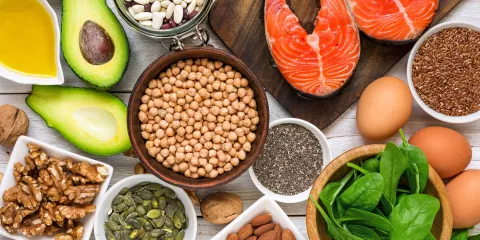
You are doing all of the “right” things and the weight is still creeping on. You are following the latest fad diet and the scale won’t budge. What has worked to get off those last few pounds in the past isn’t cutting it now. You feel tired and a good night’s sleep is elusive. If you are a woman in midlife and these statements resonate with you, read on. Because the answer isn’t in calorie counting, cutting out entire food groups or living on coffee; it is in understanding your hormones and how to eat for hormone health.
In Case You Missed In: Thriving In Midlife (Part 5)
Dietary Recommendations For Women In Midlife
Now, let’s get the basics out of the way first. The Standard American Diet, which consists of lots of fried, processed foods and sugary foods, is not going to be your friend. It is linked to weight gain, chronic disease, Type 2 diabetes, and more.1 So as you enter midlife, what should you be eating?
The most important thing to note is that every one of us is different and has unique dietary needs. There is no cookie-cutter approach that will work for everyone. But there are some tips and tricks to help you fuel your body and feel your very best.
- Eat healthy fats. Foods like avocado, coconut, olive oil, nuts and seeds and salmon are a great source of fats. Fats help you to feel more satisfied. They are the building blocks of our hormones and fuel for our brains.
- Focus on protein at every meal. Yes, every single meal. Protein is incredibly important for women as they age to help maintain lean muscle mass. In fact, decreased estrogen can be associated with a decline in muscle mass, bone density and strength.2
- Stay hydrated. With waning hormones come hot flashes, skin changes, such as laxity and dryness, and a tendency towards constipation due to changes in the gut microbiome. Staying properly hydrated is an important way to lessen these symptoms.
- Fiber is essential. While simple carbs, like bread and pasta, should be enjoyed in moderation, complex carbs are an important part of the diet for midlife women. They contain the fiber necessary for maintaining regularity and may also help with menopausal symptoms.3 Complex carbs are things like sweet potatoes, berries, cruciferous veggies and apples.
- Cut back on the alcohol. A glass or two of wine a night has become the norm for so many women. Midlife and the menopausal transition are times when those two drinks can be detrimental in a number of ways. Alcohol can raise cortisol levels, which disrupts sleep and can lead to blood sugar and insulin dysregulation the following day. This can stall weight loss, which is frustrating, if that is a goal for you. Alcohol can cross the blood-brain barrier and reach brain cells. The effects of alcohol worsen after age 30, and hangovers linger longer.4 Current research suggests that even moderate alcohol consumption may raise the risk of breast cancer.5 Also, chronic alcohol use can affect the body’s stress response, leading to premature aging.6 Consider swapping out that nightly wine for a kombucha or seltzer water with lime.
There are many changes that take place in the body during perimenopause and menopause. Eating for hormone health using the tips above can help you to feel your best, stay energized and healthy as you transition to the next phase of life.
Articles You Might Also Like
References
1 Institute of Medicine (US) Committee on Examination of Front-of-Package Nutrition Rating Systems and Symbols; Wartella EA, Lichtenstein AH, Boon CS, editors. Front-of-Package Nutrition Rating Systems and Symbols: Phase I Report. Washington (DC): National Academies Press (US); 2010. 4, Overview of Health and Diet in America. Available from: https://www.ncbi.nlm.nih.gov/books/NBK209844/
2 Maltais ML, Desroches J, Dionne IJ. Changes in muscle mass and strength after menopause. J Musculoskelet Neuronal Interact. 2009 Oct-Dec;9(4):186-97. PMID: 19949277.
3 Kroenke CH, Caan BJ, Stefanick ML, Anderson G, Brzyski R, Johnson KC, LeBlanc E, Lee C, La Croix AZ, Park HL, Sims ST, Vitolins M, Wallace R. Effects of a dietary intervention and weight change on vasomotor symptoms in the Women's Health Initiative. Menopause. 2012 Sep;19(9):980-8. doi: 10.1097/gme.0b013e31824f606e. PMID: 22781782; PMCID: PMC3428489.
4 https://www.healthline.com/health-news/whats-age-got-to-do-with-drinking-a-lot
5 Register TC, Cline JM, Shively CA. Health issues in postmenopausal women who drink. Alcohol Res Health. 2002;26(4):299-307. PMID: 12875041; PMCID: PMC6676683.
6 Spencer, R.L and Hutchison, K.E. Alcohol, Aging, and the Stress Response. Alcohol Res Health. 1999:23(4):272-282. Retrieved from: https://pubs.niaaa.nih.gov/publications/arh23-4/272-283.pdf












